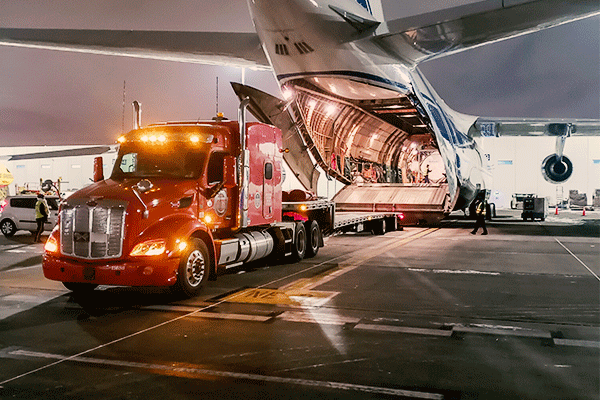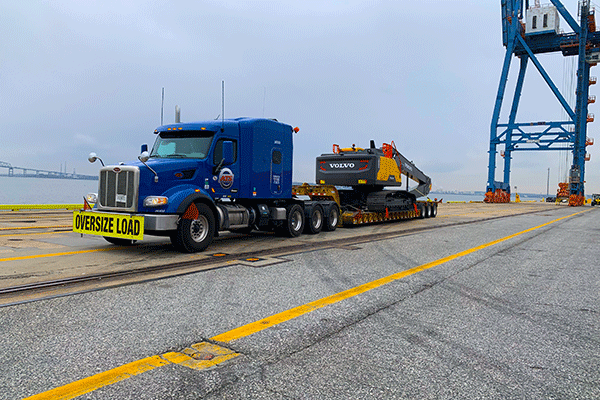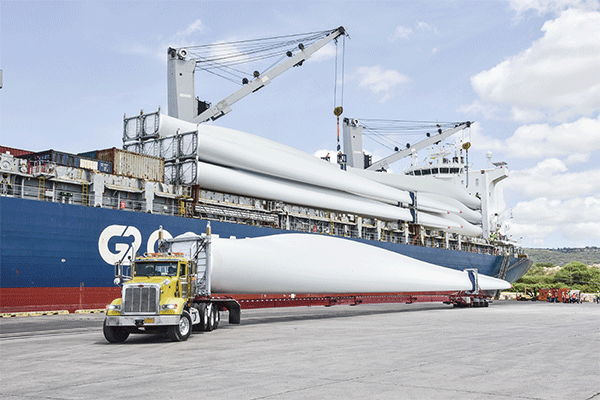As a shipper looking to move freight to another country, it’s ok if this process leaves you feeling overwhelmed. International transportation is an intricate undertaking and with so much at stake, your hesitancy is likely warranted.
Many shippers, just like you, with goals just like yours, have the very same thoughts you’re having right now.
Where should I start? What do I need to consider? What transportation providers are my best option?
All of these questions are valid, but it’s important you know that you’re not alone here.
Freight forwarders offer comprehensive international transportation services with the specific goal of easing the burden you feel.
Here at ATS International, we’ve been moving cargo as a freight forwarder for decades so we have an intimate understanding of what forwarders can offer shippers like you.
By the end of this article, you’ll understand this too.
Not only will the information below leave you with a better understanding of what freight forwarders are, but we’ll give you some tools for making your next international shipment a resounding success.
Below, you’ll find answers to the questions of:
- What is a freight forwarder?
- What are the duties of a freight forwarder?
- What are the alternatives to using a freight forwarder?
What is a Freight Forwarder?
Freight forwarders are third-party transportation providers working to connect companies that have international cargoes to move with the transportation assets needed to do so. Freight forwarders, also known as “forwarders”, typically help shippers move freight via land, rail, air and/or sea to either a stop-off point or to a final destination and end customer.
These third-party international transportation providers come in a variety of sizes ranging from one-man operations to multi-divisional corporations. Similar to freight brokers in cost structure, freight forwarders make money in the margin between what they charge their client, and what they pay the companies they work with to get goods moved.
Where cargo size is concerned, freight forwarders can help shippers move freight in all size tiers. This ranges from less-than-containerload (LTC) all the way up to oversized, heavy-lift, and breakbulk commodities.
International transportation is an incredibly intricate process. Without proper management, properly filing international forms and documents, abiding by regulations and fine-tuning processes, things can quickly get overwhelming — especially for more inexperienced shippers.
As such, companies worldwide lean on the expertise of a good freight forwarder to handle the distribution of cargo.

What Are The Duties of a Freight Forwarder?
This world is huge. 195 countries huge. Each of these countries boasts a unique form of government, rich history and set of rules and regulations where freight transportation is concerned.
As you can imagine, this massive amount of variables — variables that fluctuate with every shipment — leave freight forwarders with a lot to consider.
That said, the best companies consistently work to fine-tune their expertise and do the little things to help their customers thrive — no matter their requirements.
As far as duties go, it’s difficult to neatly package all of the things that freight forwarders handle on a day-to-day basis. From warehousing and route planning to transport consultation services, freight forwarders are something of a chameleon in the transportation world.
There are four things, however, that every freight forwarding company must do to provide the vital services their customers are looking for.
The four main duties of a freight forwarder are:
- Form each shipper’s transport concept.
- Vett, select and utilize best-fit transportation companies.
- Fill out all necessary forms and documentation.
- Educate and update customers regularly.
Let’s talk a bit about each of them.
#1 Form Each Shipper’s Transportation Concept
Timelines, origins, destinations, dimensions and cargo types are rarely consistent from one load to the next. For good freight forwarders — forwarders with extensive experience and a history of reliability — this isn’t an issue.
Instead, the best companies in this industry focus on forming the best “transportation concept” for each shipment. In a nutshell, a load’s transportation concept — also called its transport concept — is a comprehensive outline of the actions it will take at each step of its journey.
For these plans to be successful, it’s important that the best-fit accommodations for each shipment are identified at five levels.
To give you an idea of what this looks like, here are the things that freight forwarders consider when moving freight across the ocean:
1. Pre-Carriage Accommodations
In this stage, freight forwarders work to identify and outline the best possible in-land transportation solution — from their customer’s dock to the port — for each load.
- Would finding a truck in this companies origin be the best possible route to take?
- Maybe transporting this load to the port via rail would be more cost-effective?
- Which companies in this country do we have a pre-existing relationship with that we trust to come through for us again?
These, and questions like these, are consistently asked and solved for in this stage of the transport concept. This helps freight forwarders ensure that every load secures the best possible transportation solution from its origin to its port of export (POE).
2. Selecting The Best Possible Port of Export
The second portion of each load’s transport concept addresses the question of: “which port in this shipment’s home country makes the most sense to utilize?”
The answer to this query depends on a freight forwarder’s history working within the region in question and the requirements of the load in transit.
Often, forwarders like to work with ports they’re familiar with, that have procedures and capabilities they understand. That said, good companies will always prioritize their customer’s needs and plan their POE accordingly.
As such, you can rest assured that a great forwarder will match your freight’s port to what its dimensions, final destination and deadlines dictate.
3. Choosing a Load’s Best-Fit Ocean Carrier
This one is crucial. Without a dependable ocean carrier, moving your goods per your timelines won’t be possible. Good freight forwarders know this.
To help their customers avoid costly delays, forwarders secure cargo space on the correct vessel type, but also choose the correct vessel carrier that matches the specific shipping schedule that will meet their clients needs.
These are carriers that are not only located in their selected POE but are carriers that a forwarder knows will come through on their commitments and adequately communicate crucial updates.
In an industry where momentary delays can be costly in the long term, freight forwarders focus on working with only the best carriers for ocean-bound freight.
4. Selecting The Best-Fit Route For Freight Transit
The second to last thing that freight forwarders must account for when forming their customer’s transport concept is the route by which freight should reach its final resting point.
For some transactions, switching vessels at a stop-off point might be most cost-effective. In other scenarios, loading a vessel headed directly to a load’s country of destination is a better option.
In this stage of a freight forwarder’s transportation concept, a load’s route is planned and a port of discharge (POD) is selected.
5. On-Carriage Accommodations
The final stage of any good transportation concept is, arranging for the transport of cargo from the POD it arrives at to its final destination.
Although this can be done through several avenues, freight forwarders look to find the most cost-effective solution that will reliably fit their customer’s timelines.
In some cases, this means arranging for a truck driver to pick up freight from the port and haul it to the consignee’s door. Other instances call for freight to be moved via rail to its endpoint. By keeping their customer’s budgets and timelines in mind, freight forwarders can make these final, crucial, arrangements.
Related: What Does International Shipping Cost?

#2 Vett, Select and Utilize Best-Fit Transportation Carriers
Like a freight brokerage or any other third-party provider, forwarders are reliant on their relationships above all else. Only by maintaining working relationships with great carriers in each area can these providers stay in business.
And, in a world as big as ours, building these bonds and vetting each company is a tall order that freight forwarders must fill.
Sure, all of a freight forwarder’s duties are important, but maintaining connections with only the best companies is perhaps the most crucial of all. As such, the best freight forwarders make this a priority by continually utilizing the companies they trust and building bonds that extend beyond the business world.
It would be easy to simply choose an unfamiliar carrier each time a new customer comes their way. Building an international transportation network is difficult, but the best forwarders are up for the challenge.
Through continual use of good carriers — and the proactive elimination of underperforming companies — forwarders can fill their networks with quality partnerships. This helps them come through when their customers need them the most and cement themselves as a valued partner with the carriers they utilize.

#3 Fill Out International Forms and Documents
To say international freight transportation is complex would be an understatement. Honestly, when it comes to moving cargoes, it doesn’t get more intricate. Every country has different rules and regulations enforced in different ways by varying governing bodies.
As such, it’s not unusual for shippers — without the expertise of a good forwarder in their corner — to struggle to keep things moving.
What documents will I need to have ready at each step in my freight’s journey?
How much time should I dedicate to organizing the proper forms and paperwork?
Will each country require different types of documentation or multiple copies of some?
These are the types of questions that leave shippers feeling overwhelmed and these are the types of issues that freight forwarders handle for them.
You see, many of these companies have teams of experts dedicated to ensuring the requirements of every load are met. Mitigating potential issues by properly managing and filling out paperwork are one of the largest duties freight forwarders fulfill.
Though the exact documentation varies depending on the specifics of each project, freight forwarders can help companies with all kinds of international paperwork including but not limited to:
- Commercial and Proforma Invoices
- Bills of Lading
- Packing List
- Shipper’s Letter of Instructions (SLI)
- Automated Export System (AES) Filing
- Certificate of Origin (CO)
- Incoterms
- Safety Data Sheet (SDS)
- Operational Instructions
- Shipping Under a Letter of Credit
Related: What Documents Are Required For International Shipping?
#4 Educate and Update Customers Regularly
Look, understanding the transportation industry, what makes it tick, what impacts pricing and how to navigate it successfully, can be really difficult.
As companies and individuals that work in it every day, freight forwarders need these understandings to be successful. And, over time, the best businesses can develop them.
That said, well-run freight forwarding companies recognize that their customers might not have their level of expertise — especially where international transport is concerned.
In the interest of giving them these understandings, leveling the playing field and setting them up for success, freight forwarders prioritize educating every shipment’s grouping of core stakeholders.
This helps forwarders ensure customer satisfaction and comfort through every step of their freight’s transit. Additionally, good companies utilize technologies to give their customers all available in-transit updates.
What Is The Alternative to Using a Freight Forwarder?
Moving cargo across international borders isn’t always easy but that doesn’t make it impossible. For this reason, the most common alternative to using a freight forwarder for international transportation is to handle these processes in-house.
This is seen most frequently among companies with the resources to handle the commitment it takes — typically large corporations with logistics and international divisions.
That said, it’s not unheard of for smaller shippers to move freight internationally on their own. Some businesses have the wherewithal and expertise needed to move an incidental shipment or two without assistance from a freight forwarder.
Whether it’s by working with a third-party logistics company (3PL) or on their own, it can certainly make sense for companies to negotiate their freight’s transit.
If this is something you’re interested in taking care of internally, you’ll want to arm yourself with the necessary tools.
Here at ATS International, we take pride in producing educational content to help shippers maximize their international shipping budgets and get more from each load. As a result of these efforts, our Learning Hub is full of materials that will give you some much-needed international transportation insights. Check them out today!




